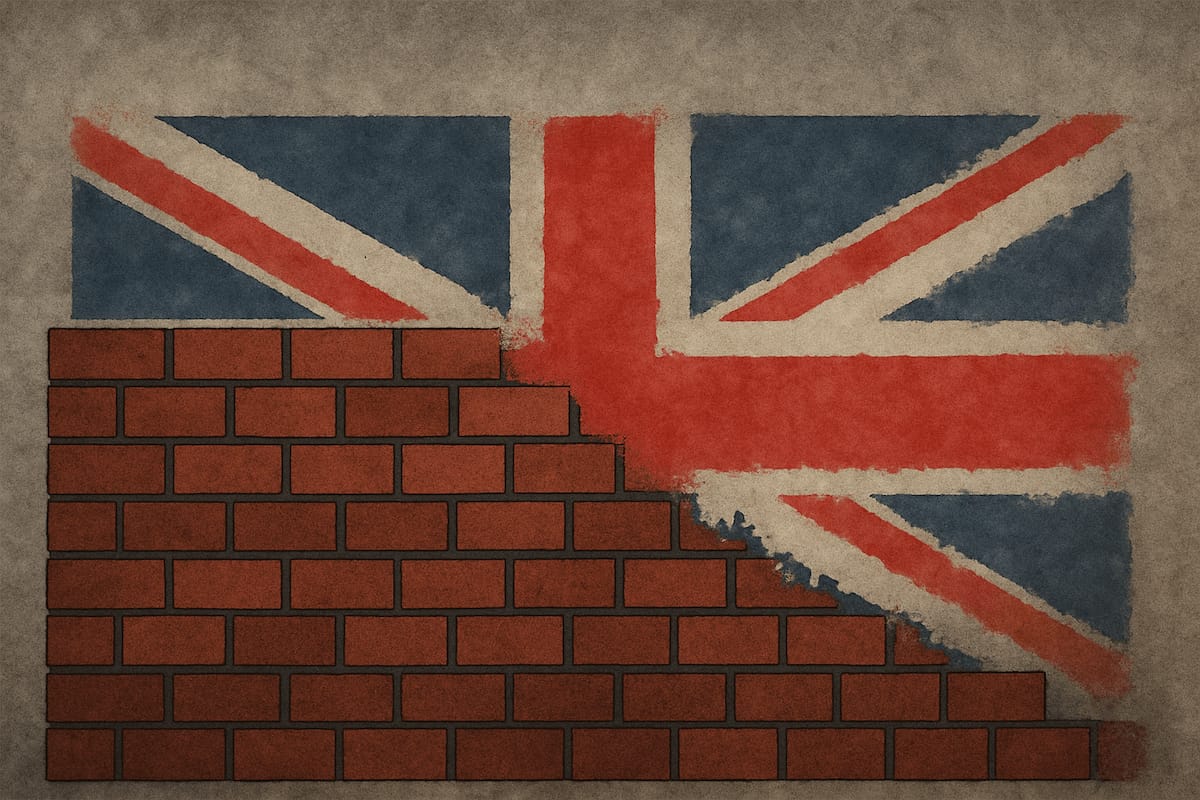Strategic autonomy on American terms
Welcome to Pyromania-on-Avon + Britain's prison crisis of foreigners

Editor’s note
Humiliation abroad, disorder at home. This week exposes a West that can neither project power nor maintain order. Brussels folded to Trump’s trade threats with barely a murmur. All the rhetoric of “strategic autonomy” crumbled when faced with American leverage and European timidity. The EU was played not by a genius tactician, but by someone who understood power’s basic rules: threaten, wait, win.
At home, the rot is visible on our own streets. In Bristol, machete attacks and blazing vehicles are met with tea and biscuits. Police monitor pronouns while criminals roam free. Institutions meant to protect the public are now performing for it. A government obsessed with sentiment surveys and comms strategy looks paralysed in the face of real-world decay.
What ties it together is impotence dressed up as principle. When those in charge can no longer defend borders, enforce law or secure a fair deal, the public starts to ask what exactly they’re for.
Comment
Strategic autonomy on American terms

“This is the EU’s greatest humiliation since Britain voted to Leave,” writes Kwasi Kwarteng in The Telegraph. Jacob Reynolds at Spiked goes further, calling it “nothing short of total capitulation”. The EU’s much-hyped trade leverage has just been exposed as a myth by the same man they spent years calling a clown.
Trump’s method was brutally simple. Threaten tariffs (30 percent), wait for panic, then settle for less (15 percent) and frame it as a favour. “They are going to pay 19 percent and we are going to pay nothing,” Trump crowed after a similar deal with Indonesia. This time, he got the EU to accept tariffs triple their previous rate, sign up to $750 billion in American gas, and buy billions more in US military kit. In return? “Nothing”, as Reynolds notes. Not even the dignity of spin. “Soumission” was how France described it.
So much for “strategic autonomy”. Brussels couldn’t even hold the line against a man it sees as an aberration. Green dogma, defence freeloading, and an addiction to bureaucratic process have left the EU economically anaemic and diplomatically irrelevant. Manfred Weber called it “damage control”. Guy Verhofstadt, rarely lost for federalist fervour, called it “scandalous”.
Meanwhile, Britain, outside the EU, with its own trade policy, secured a better deal. Even Jonathan Reynolds admitted it. Which makes it all the more ironic that the very people now praising the outcome once fought to stay in the club that just got mugged.
Trump’s strategy was more instinct that policy. He understood what the Eurocrats didn’t: that to lead, you need a mandate. To negotiate, you need leverage. And to avoid humiliation, you must first know who you represent.
The Polemic
Welcome to Pyromania-on-Avon
By G.V. Chappell, via spectator.co.uk

Harvey Rothman / The Spectator
G.V. Chappell’s dispatch from the streets of Bristol reads less like a column and more like a letter from a decaying state. In The Spectator, he charts a surreal blend of suburban anarchy and bureaucratic impotence: blazing vehicles, machete attacks, open-air drug deals, and a local council whose response is, quite literally, tea and biscuits.
It’s a portrait of what passes for order in late Britain. Crimes are tolerated, police stations open part-time, and “increased patrols” exist mostly in press releases. The result, as Chappell dryly notes, is that “the mostly middle-class crowd came away with the impression that it was down to them to manage the situation.” The Home Office outsources security to Amazon Ring, while PCSOs wander around with all the gravitas of “a Boy Scout left in charge of an anti-aircraft battery.”
The heart of the piece isn’t just decline, but normalisation. Residents are numbed into absurdity, watching motorbikes burn and drunks stumble home beneath graffiti-scarred walls, then comparing notes on CCTV funding strategies over digestives. Even when Chappell escapes to Menorca — “well-run, prosperous, proud” — it only sharpens the tragedy. Returning to Britain, he writes, “felt like returning home to find the front door bashed in, the house ransacked and someone cooking crystal meth on the stove.”
And yet, despite the mounting chaos, political discourse remains focused on rainbow crosswalks, civil service lanyards, and strategic comms. We’re not witnessing a freak collapse. We’re living through a long one, mismanaged into the ground.
It ends, fittingly, with John of Gaunt’s lament: “That England... hath made a shameful conquest of itself.” Chappell doesn’t need to force the metaphor. His street is doing the job already.
Flashpoints
The police can’t control Britain’s streetsBritain’s police have abandoned the hard graft of domestic intelligence in favour of sentiment monitoring and activist appeasement, leaving them paralysed, politicised, and utterly unprepared for a rising tide of spontaneous, leaderless unrest. | Immigration heightens community tension, most Labour voters believeA majority of Labour voters now believe immigration is damaging community cohesion, as the government defends migrant hotel protests and launches a police social media monitoring unit critics say threatens free speech. |
Why the Online Safety Act must be repealedThe Online Safety Act is a repressive, un-British law that outsources censorship, undermines free speech, and provokes public resistance, proving that in the name of safety, the state has quietly built a digital wall against liberty. | Jaguar Land Rover CEO to step down after overseeing 'woke' rebrandAdrian Mardell is stepping down as CEO of Jaguar Land Rover after a 35-year career, having overseen a controversial electric rebrand and a return to profitability amid production delays and backlash over the company’s new direction. |
Comment
Britain’s prison crisis is from foreign offenders and political paralysis

Writing in The Times, Matt Dathan has uncovered the inconvenient truth that Britain's prisons are filling up again but just not with Brits. Foreign-born criminals now account for one in eight inmates, the highest proportion since 2013. Even as overall prisoner numbers dip, the tally of foreign offenders has climbed to 10,722 by June, with violent and sexual crimes notably overrepresented.
It's hardly surprising, then, that shadow justice secretary Robert Jenrick is pinning the blame squarely on "uncontrolled immigration" and calling for visa suspensions to pressure reluctant home countries into accepting their nationals back. Predictably, Nigel Farage is calling for the elusive "national conversation" Westminster seems perpetually keen to avoid: namely, why exactly our system appears so welcoming to criminals yet allergic to common sense.
Meanwhile, Labour insists deportations are on the rise and promises faster removals, though actions have yet to outpace their rhetoric. The reality, of course, is grimly comic: overcrowded prisons bursting with inmates, some London jails at 85 per cent foreign occupancy, and an early-release scheme inadvertently boosting reoffending rates.
The polite chatter among experts, about age profiles and judicial caution around flight risks, misses the heart of the issue: Britain’s immigration and justice systems are locked in mutual dysfunction. The Home Office and Ministry of Justice appear trapped in a bureaucratic dance, shuffling responsibility without solving anything.
Perhaps it's time politicians embraced the simple logic recognised everywhere except Westminster: robust borders and rigorous deportation policies aren't cruel but fundamental. Until that sinks in, expect prisons to keep filling and political credibility to keep draining away.
Worth watching
Balaji Srinivasan on the American Empire’s Collapse In this gripping interview, Srinivasan outlines a radical thesis: the American Empire is already over—its institutions hollowed out, its dollar system fraying, its cultural confidence replaced by escapism. The real power centres now are China in the physical world and the internet in the digital. As the US fractures internally along political, technological and monetary lines, individuals must build sovereign alternatives.
Quote of the week
If people like Jimmy Savile were alive today, he’d be perpetrating his crimes online. And Nigel Farage is saying that he’s on their side.
Until next time,




